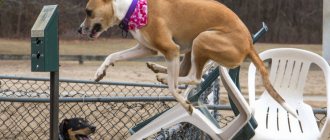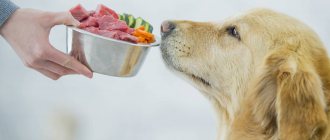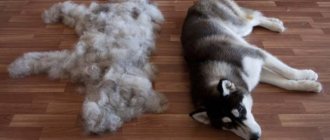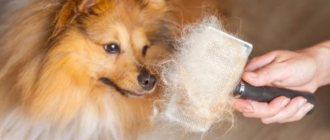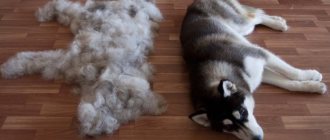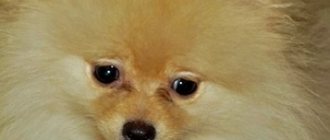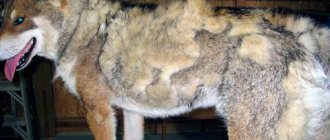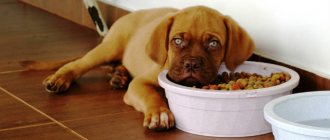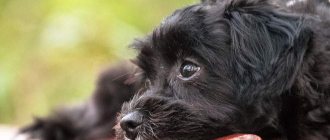The key to health, good growth and proper development of a dog is not only proper care. Balanced and nutritious nutrition of the animal deserves special attention.
Sometimes, owners notice that the puppy is constantly hungry, begs for food, or pounces on the portion of food in the bowl and asks for more. There are several reasons for this behavior.
How do dogs eat
A review of wolf feeding behavior allows us to better understand dog feeding behavior. This is a predatory species that hunts for food. When he manages to catch large prey, he absorbs a large amount of food at once and very quickly. In particular, from 8 kg to 20 kg in 24 hours .
If there is any left, it is buried for later consumption. Therefore, we see that the basis of the diet is animal protein, and food is also produced in large quantities in an irregular manner, depending on success in searching and hunting.
Domestication forced the dog to add various foods to its menu. They are now considered omnivores, although animal protein remains a key ingredient in their diet. Living with a person allows the dog to eat often. It does not need to be overfed, but the ability to eat large amounts of food remains.
Risks associated with eating food too quickly
If a dog eats food quickly, this can not only signal illness, but also cause illness in itself. According to the American Kennel Club (AKC), if a dog eats too quickly, he may experience digestive problems and vomit. More serious consequences include the risk of choking due to poor chewing of food. Additionally, when a dog eats very quickly, it swallows too much air, which can lead to bloating, says the AKC. Bloating is a very uncomfortable condition for your pet.
The American College of Veterinary Surgeons explains that a very serious and life-threatening condition associated with eating large amounts of food at one time is acute gastric dilation (AGD). POM requires immediate attention from a veterinarian, as it causes torsion in the dog's stomach and can lead to its rupture.
If the reason for your dog's rapid food intake is unclear, it should be taken to your veterinarian, especially when this is a new habit.
Importance of Dog Food
Dogs are usually fed a nutritious diet in homes that covers all their nutritional needs. But to a greater or lesser extent they are attracted by what their teachers eat.
This is normal because, first of all, their instinct is to eat as much as possible because they don't know when they will get food again. In addition, for dogs, people are a guide and want to do everything they see. This includes meals. For dogs, sharing food is a sign of affection.
Why do puppies eat everything?
Puppies pick up objects and explore the world with their mouths. Chewing, swallowing, and sometimes gulping is their way of learning what is edible and what (ideally) is not. While this behavior stems from a natural instinct that puppies often outgrow, especially with training, it can get them into trouble, even leading to blockages or poisoning.
Eating an inappropriate item can become tempting—even irresistible—when it is seasoned or flavored. Common problem items include grease-covered kitchen utensils, baby bottle nipples, used tampons, or dirty diapers.
Other problematic items are those that smell like you, such as worn-out socks or slippers, so it is important to keep all such items out of your puppy's reach until he learns that they are inappropriate food.
Polyphagia in a dog
Polyphagia is defined as an increase in food intake. The dog eats voraciously, but is still always hungry. He never seems to get enough, even though he eats more than the recommended diet according to his characteristics. Of course, we must distinguish polyphagia from normal hunger.
You need to understand that a dog feels normal hunger when he is offered less food than he needs, or poor quality food that does not meet all of his nutritional needs. It is also necessary to adapt the diet to the dog's physical activity and keep in mind that its requirements change depending on its life stage.
In addition, there are physical and psychological pathologies that cause polyphagia. Both can cause other symptoms. For this reason, if you suspect your friend has polyphagia, you should contact your veterinarian to get a diagnosis and begin treatment. If the origin is psychological, your veterinarian will refer you to a professional dog psychologist.
Why does a dog eat quickly?
Your dog probably really likes his food, but most likely he eats quickly for one of the following reasons:
- Competition. If you have more than one dog, a fast eater probably feels like he has to hurry before other dogs take his food. Perhaps when the pet was still a puppy, he had to fight for food with his brothers and sisters. This feeling of competition can be instinctive. Even if the dog is the only one in the house, it may view other family members, including cats and people, as competitors.
- Irregular feeding schedule. If you adopted a dog from a shelter, its previous owners may not have followed a proper feeding schedule. That's why she acts like she's not sure when she'll get her next meal. This is precisely the reason why a dog eats quickly. The same can be said about animals that were previously homeless and had to find food on their own. Give your dog time to understand that he doesn't need to rush anymore because you love him very much, care for him and will feed him again soon.
- Poor quality food. Perhaps the reason lies in the dog's diet. Some foods may be poorly balanced. Consult with a veterinarian who will check that your dog is getting all the nutrients it needs and recommend a good quality food.
- Health disorders. Perhaps your pet's excessive hunger is caused by some kind of disease. Diabetes and Cushing's syndrome can affect a dog's metabolism and increase its appetite, writes Puppytip. The reason may also be infection with helminths or other parasites.
Common causes of polyphagia
There are various physical diseases that occur with polyphagia as one of the symptoms. Fortunately, some are rare, such as hyperthyroidism.
These are diabetes, malabsorption syndrome or exocrine pancreatic insufficiency . All require veterinary treatment. Pay attention to other symptoms such as increased urine, weight loss, poor diet, diarrhea, vomiting or dehydration.
Hidden Gems of Mud
Some puppies are drawn to different types of dirt or want to chew rocks. Perhaps smell plays a role in attraction. This is especially true if the urine has marked the area of some other creature. Puppies can taste the dirt to better understand what the message is saying.
Some dogs may prefer certain areas, such as piles of mulch, which may have a mushroom aroma or taste. Excessive dirt chewing can upset your pup's digestive system, but the occasional taste probably won't cause problems.
On the other hand, chewing stones is a habit that should be avoided. Not only is this destructive to your puppy's teeth, but it can also pose a choking hazard. If your puppy is teething and is eager to chew, give him pet-friendly chew toys. Ask your veterinarian about options.
How to stop a dog from asking for food
When the problem with food is at a psychological level (the dog always seems hungry, although in fact its diet is fine), in addition to the instructions that the expert considers necessary depending on each specific case, some general measures can be implemented, such as:
- Increasing the amount of fiber in the diet. Follow your veterinarian's advice to select the appropriate food.
- Divide your daily diet into several snacks.
- Establish a feeding schedule, that is, offer food at the same time every day. Dogs like predictability, so knowing a schedule reduces anxiety.
- You can offer some of the food in interactive toys. Mental stimulation is another way to combat stress.
- A dog's well-being requires stimulation both physically and mentally. So it's important that we spend time with him, take him for walks, play with him and things like that. This way, anxiety is minimized.
In the end, I would like to say that the reason why your dog seems to always be hungry comes from his ancestors, wolves hunt prey and cannot always get a positive result, so when they catch food they try to eat the maximum amount.
Eaters remain eaters
My own puppy likes to eat quickly and I really don't like this behavior. In fact, he attacks a regular dog bowl and finishes his small dog's 1/3 cup portion in about 8 seconds.
Yes, he has a slow feeder and I leave a food puzzle for her to use for treats when we leave her alone for a few hours. Still—and I realize I'm anthropomorphizing—I'm sad because she doesn't seem to truly enjoy eating. She is obsessed, never satisfied. It's like watching obsessive-compulsive disorder.
Did I mention she's overweight? It's really easy to overfeed such dogs because they always have that expectant expression on their face. Anyone remember Little Shop of Horrors? Well, my dog is little Audrey II. Her face constantly says, “Feed me.” She only lost 100 grams thanks to more exercise.
Article Author : Dr. Deborah Lichtenberg , a small animal and exotic animal veterinarian, has been practicing medicine for over 30 years. Graduate of the University of Pennsylvania School of Veterinary Medicine. Dr. Lichtenberg has been writing about dogs for many years and has been awarded Certificates of Excellence by the Canine Writers Association of America.
Problems with poop
People whose dogs eat feces consider it a disgusting habit, and it is a common occurrence in puppies. Puppies are especially attracted to snacking on nuggets from cat boxes, cow patties or horse droppings. Some of these animals do not always fully digest their food, so nutrients may remain in their waste. However, this behavior should definitely not be encouraged, as any feces may contain harmful parasites. The good news is that many puppies outgrow feces as they get older.
Next steps
Before you start training, your puppy may eat something forbidden at least a few times. If this happens, there are several steps you can take to keep your pet safe:
- In most cases, small objects will pass harmlessly through your puppy's body and end up on the lawn within 24 to 72 hours.
- Make sure you know how to handle specific foreign objects or substances that your puppy ingests. Some of them can be as dangerous as they come up as they go down, so it's a good idea to call your veterinarian for quick advice. She will be able to tell you if the puppy needs to come in for an exam, or if you should induce vomiting or wait for the object to pass.
- If your vet advises skipping it, take a stick and wear gloves so you can poke the puppy's droppings to make sure the object is out of his body. Feeding your dog food can activate digestive juices, soften the item and help it move on.
Pet's spoiling
Far from being the least important reason would be arrogance. The pet is extremely demanding and is confident that you will feed it, in particular from your hands, and even better from the table, with harmful but tasty treats. Pampering is manifested in inviolability of the bowl and subsequent sitting and begging for food at the master's table. To solve this problem, it is enough to completely eliminate complementary feeding with all sorts of goodies. Leave the bowl of food for literally fifteen minutes; if you haven’t eaten it, then remove the bowl until the next meal.
Dirty or alien
A puppy may refuse to eat from a bowl if it smells foreign or simply unfamiliar and unpleasant odors. A typical situation: you washed the bowl using detergent, but you didn’t wash it well enough, which is why the dog smells chemicals and refuses to eat from such dishes.
There are cases when pets are very respectful and kind to other people's property and prefer to eat exclusively from their own bowl. In these cases, it will be enough to wash and rinse the bowl well in order to get rid of foreign odors.
